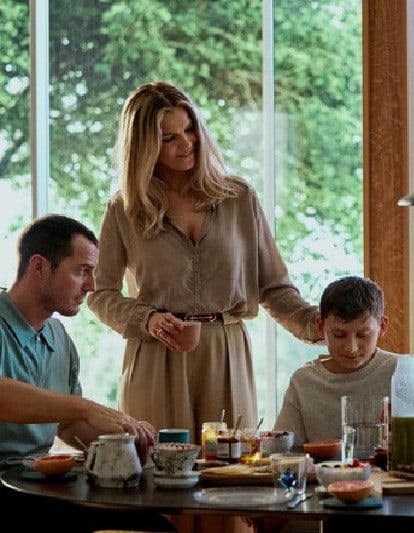PUBLISHED
May 25, 2025
KARACHI:
The latest Scandi Noir series on Netflix is a curious drama that explores themes set in a context far away from our world, yet close to home for many middle-class desi households.
Cecilie is a dynamic working woman belonging to the elite class of Denmark. Living in an affluent suburban neighbourhood, her two children are looked after by a Filipino au pair, Angel. Nextdoor it is the same case, at her best friend’s Katarina’s house, who’s husband is Cecilie’s husband’s boss. Cecilie’s older son Viggo is tight with Katarina’s son Oscar too and both go to the same school. The thriller begins when the neighbour’s au pair Ruby is over one night to hang out with Angel. Ruby is young, diminutive and meek, new to Denmark and its culture. Her immigrant status is yet another factor that makes her vulnerable. After dinner, she tries to tell Cecilie that she is having trouble living with her employers. Cecilie answers kindly that she cannot help and Ruby should talk directly to the couple.
That is the last time Ruby is seen.
Angel is worried about Ruby’s disappearance but for Katarina and her husband it’s no skin off their backs to have their nanny vanish into thin air. Katarina only points out how unreliable Ruby is to go AWOL just when her son’s classes are around the corner.
Cecilie is shown as more sympathetic to her au pair. She speaks to her warmly and says she is part of the family. Sometimes when she is overwhelmed, she shares her troubles with Angel too. As the au pair, Angel takes care of everything from feeding the family and tucking the children in bed. However, it is only after Ruby goes missing, that for the first time Cecilie is struck by Angel’s growing concern for Ruby and feels obliged to step in and help her. Whe she lifts one boundary out of the way in her relationship with her employee, Cecilie is forced to see a world she never cared to look at before: the personal lives of underprivileged women who risk everything just to earn a livelihood for their families they have left in their native countries. Unfortunately Cecilie comes from such a different world, that she can never grasp the reality of another.

In our homes we are used to rely on domestic staff to run our homes full-time or part-time as the case may be. We too are in positions of power as their employers. Some of us are willing to help them monetarily other than the salary we pay our domestic staff, but some keep a safe distance wary that once we lend a helping hand, the demands and requests won’t stop. We also fear we will be taken advantage of by them. Some will go all the way to become a support system for their employees while others will firmly keep them at a distance. We can either treat them with a sense of entitlement which is what Katarina and her family display in the Danish series, with no personal investment in our hired help. Or we can be more discerning and humanise them as Cecilie exemplifies, yet is it the guilt of belonging to a superior socioeconomic class or sheer magnanimity that drives us to be kinder to them? Secrets We Keep casts an eye on this everyday reality in a very nuanced and compelling manner.
The class divide is seen through the lens of racism and immigration in the show. When Cecilie has meltdowns in front of Angel due to her postpartum depression, it feels unbalanced in comparison to the struggles of a young Filipino woman who is living more or less at the mercy of European strangers in order to feed mouths at home.
However, it is in Katarina that we notice the stark display of white women’s tears. Many white women employ a victim complex to gain sympathy and avoid accountability by turning the tables and accusing their accuser. The trauma caused by such a tactic is termed as white women’s tears. It dovetails Rudyard Kipling’s infamous poem White Man’s Burden, which framed the American acquisition of the Philippines as a moral imperative, advocating the colonial mindset of a superior race feeling the responsibility to civilize an inferior people.
Katarina personifies the heartlessness and self importance of the elite. Her initial indifference about her missing nanny turns into an exhibition of white woman tears. She turns into a damsel in distress when she becomes a suspect in the case. Time and again she turns to Cecilie to bail her out of messy situations by feigning emotional weakness. For example, she forces Cecilie to go for Ruby’s body identification when the police discover a body in the marina, even though it is her employee in question and therefore her responsibility. She manipulates Cecilie’s support and makes her feel guilty by reminding her of how she has been there for her in the past.
The plot twists in Secets are a descent into all that can be murky under the surface of a seemingly perfect life. When Cecilie finds a pregnancy test belonging to Ruby, she starts to suspect not only her best friend’s husband – the high turnover rate of au pairs in their house is fishy – but even her own husband. The viewers learn through the police investigation, that her husband Mike has a previous misdemeanour – and it is a rape charge. Cecilie tries to defend her husband, convincing herself and the detective leading the case that it was long ago and Mike has changed his life completely since then. But the question hangs in the air. Neither she nor the viewer are fully convinced of Mike’s innocence. Mike’s ego-massaging of his shady boss doesn’t help matters. Caught between getting to the truth behind a young girl’s disappearance and keeping her own marriage and friendship intact, Cecilie’s world loses all sense of security and nothing is black and white anymore, everything is a grey area.

White feminism and its limits
As the mystery unfolds, it becomes clear that Cecilie’s awakening to the injustice around her is both belated and incomplete. At work, Cecilie has no qualms to push the strong woman image and put men in their place for being semester. But when justice demands personal sacrifice her white feminism comes into question — and it ultimately fails.
White feminism is often critiqued for prioritizing the concerns of privileged, white, Western women while ignoring marginalized groups. Cecilie is, in many ways, the archetype: a woman who sees herself as progressive, empathetic, and fair-minded. When Ruby goes missing, Cecilie’s initial instinct is to assume Ruby ran away. It’s only through Angel’s insistence and visible distress that she begins to take the matter seriously.
This hesitation is telling. Cecilie, like many real-life white feminists, occupies a space where concern for marginalized women is more rhetorical than radical. Her compassion has boundaries; boundaries that maintain her comfort, her social status, and her emotional detachment. She only becomes truly involved when the consequences of her inaction brush up against her own family. Even then, her commitment to truth wavers as the implications grow more dangerous.
As the layers of the mystery are peeled back, the viewer learns a horrifying truth about Ruby’s end. Cecilie, who knows the truth by the end, stops short of pursuing justice.
Here, the show turns its gaze on the complicity of liberal white women in upholding patriarchal and racialized systems of power. Cecilie doesn’t commit the crime, but she benefits from the silence around it. She lives in the same protected suburb, employs a domestic worker whose legal and social vulnerabilities she only begins to understand too late, and ultimately chooses family over justice — just as Katarina does.

Secrets We Keep offers no absolution for her tears or her torment. Her moments of outrage do not absolve her of earlier indifference, and her proximity to the truth does not guarantee courage. In this way, the series offers a sharp, necessary critique of white feminism’s emotional investment in “doing good” without engaging in the structural change or risk-taking required to actually disrupt systems of oppression.
This critique echoes real-world patterns, where women from wealthier countries employ women from the Global South to care for their children, clean their homes, and carry the emotional labour of daily life, often for low wages and under precarious visa conditions. These relationships are frequently framed as “feminist” acts enabling career-minded women to “have it all”. However, rarely does that ensure any empathy, let alone justice, to the migrant women whose lives are invisibly entangled with their own.
In one particularly telling scene, Cecilie asks Angel why she didn’t tell her about Ruby’s pregnancy. Angel responds with a look that says more than words could: a mixture of pain, mistrust, and quiet knowledge that Cecilie wouldn’t have done anything anyway. Angel also omits to share that she too is a mother and has left her child behind in the Philippines, with her sister.

Incel culture among young teens
Reminders of the recent Netflix hit Adolescence run through Secrets as we get a glimpse into the secret lives of the two boys under the care of au pairs. Whereas the au pairs are devoted in their duties of looking after their wards, both preteen boys each have weird attachments to their nannies. Both boys spend more time with the au pairs more than their own mothers. In the absence of his mom, Viggo grows attached to the nurturing Angel, sleeping next to her at nights, even stealing cash to help her when he sees her request for help being dismissed by Cecilie.
The neighbour’s boy Oscar is clearly a troubled teen. He films questionable videos of girls and women and posts them online. Viggo is pressured by other boys to do the same. Unbeknownst to either set of parents, they have circulated intimate content videos of Ruby, too.
Secrets is a slow burn thriller with unpredictable plot twists and there’s many of them. The first episode will give you the misperception of a quietly paced domestic drama. It gathers speed and drops shocking revelations in such a well orchestrated points that you willing yourself drawn quickly into the mystery. The biggest bombshells in Cecilie’s life, including the last reveal, are dropped noiselessly and that is perhaps the success of this show which maintains an understated tone. Despite its foreign context, it imitates real family life and the dark corners of a woman’s interior world that she navigates alone.

